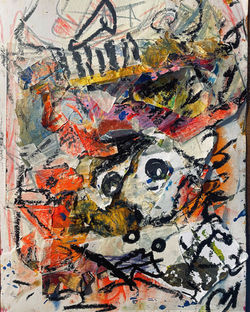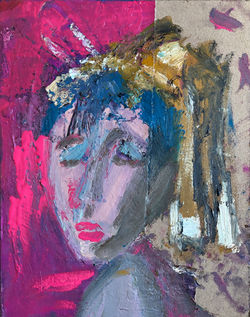Paschal Wilson
Paschal Wilson is a self-taught artist from Oxford, Mississippi, working under the name Take the Gloves Off. Rooted in raw emotion, contradiction, and spiritual tension, his practice began as a desperate attempt to communicate what words couldn’t. Primarily using oil and acrylic, his work blurs abstraction and figuration in a style that’s at once violent, tender, and defiantly unfiltered. Paschal's art confronts themes of love and hate, innocence and depravity, and the tension between performance and honesty. His recurring symbols—boxing gloves and bare hands—reflect this duality. Deeply influenced by Muhammad Ali, his work is a fight against apathy, a pursuit of truth, and an expression of radical self-worth. For Paschal, painting isn’t just expression—it’s survival.


Acrylics on canvas

Acrylics on canvas
Take the Gloves Off: The Brutal Grace of Paschal Wilson’s Art
In the quiet town of Oxford, Mississippi, an artist has been building a world out of chaos, contradiction, and uncompromising truth. Paschal Wilson—working under the moniker Take the Gloves Off—did not arrive at art through a childhood passion or structured education. He came to it out of desperation. “I started making art because I was depressed and confused,” he says. “Words weren’t enough.” Art, for Paschal, wasn’t a choice. It was survival—a way to scream in color when language failed. What began as frantic self-explanation slowly evolved into a body of work defined by its emotional rawness, spiritual tension, and the courage to face what most would bury.
A Language Born in Desperation
Though he’d always been a casual doodler (he once had a childhood comic strip about a ninja toilet), Paschal didn’t take art seriously until late high school and college. Feeling lost and envious of others who seemed to express themselves with clarity—musicians, peers, even his sister—he turned to painting out of sheer necessity. “I’ve been the one living vicariously in the past,” he admits. “Now I make the art I tell myself they should have made.” His earliest works were urgent and abstract, often created in emotional extremes. He painted with both hands, finger-painted, broke canvases, let water alter his work—acts of both destruction and devotion. His style emerged as something angry, childlike, and spiritual all at once. A war against numbness. A cry for clarity.
Pain, Power, and a Pivotal Friendship
One of the most defining chapters of Paschal’s journey was a long, complicated friendship with someone who initially inspired him to take art seriously. That relationship eventually became toxic—riddled with creative control, projection, and manipulation. “It got to a point where I felt like his dancing monkey,” Paschal says. “He’d give me drugs and expect me to make art on demand to fulfill his vision.” It was a pivotal break. One that forced Paschal to reclaim his autonomy. “You can’t rely on anyone else to believe in you,” he says. “Because eventually they’ll project their own expectations onto you.” Walking away wasn’t just personal—it was artistic. It was the moment he took his own gloves off.
Walls Full of His Own Work
Despite not yet having solo shows or major institutional backing, Paschal measures success differently. He talks about sitting in his room, every wall covered in his own work. “Not band posters. Not Warhol prints. Mine.” The pride comes not from accolades but from a sense of voice, confidence, and identity that art has given him.
 |  |
|---|---|
 |  |
Take the Gloves Off: A Manifesto
The phrase Take the Gloves Off began as a joke—something he saw on Instagram under a photo of a man wearing latex gloves. But it struck a nerve. It took him years to understand why. Through deep spiritual searching and an obsession with Muhammad Ali, Paschal found the meaning. “It’s not about boxing or breaking your hands. It’s about ungloved honesty.” Boxing gloves, he explains, protect the fighter’s hands, not their opponent. They let the fight go on longer—causing more damage. “The gloves don’t help anyone.” Take the Gloves Off became both a personal reckoning and a public demand. “It’s a war on subtlety. A call for violent intimacy. For honest damage over numbed illusion. For being seen exactly as you are.” In a culture of performance, Paschal wants to be real, even if it hurts. Especially if it hurts.
Art as Faith and Fight
Paschal's primary influence is Muhammad Ali—not just for his skill in the ring but for his integrity outside of it. Ali’s refusal to fight in the Vietnam War, his conversion to Islam, and his sacrifice at the height of his fame remain central to Paschal’s understanding of greatness. “Ali was on top of the mountain looking straight up at the stars. That’s what greatness is.” Like Ali, Paschal sees his medium—painting—not as the point, but as the vessel. “Boxing was just Ali’s medium. Art is mine.”
Lessons from the Canvas
For those navigating creative doubt, Paschal offers unfiltered, hard-earned wisdom: “Make mistakes. Use your off hand. Finger paint. Eat paint if you have to. Shut the fuck up and make art.” He believes art must be made from instinct, not perfectionism. That every mistake is a clue. That every piece is its own guide. “If you’re not making art, you should be scheming art. If you’re not scheming, you should be looking around. Every idea is a gift from God.” Paschal also warns against the performance of guilt, of pride disguised as self-deprecation. “Depression is pride. Quitting is pride. Self-pity is pride.” What he calls for is real humility—the kind that demands action. “True humility demands self-respect. And respecting yourself as an artist demands that you make art.”
The Dance of Making
For Paschal, success isn’t in the result—it’s in the moment of making. “You achieve perfection by chasing the piece you’re making right now, before you’ve even formed an idea of what the end result ought to be.” In those moments of total immersion, where control and chaos become indistinguishable, he finds peace. He finds God. “Success is escape and complete victory over yourself. It’s existing in the truth, love, and beautiful light that is God for however long you can stop lying to yourself.”
Paschal Wilson’s art doesn’t ask for your approval. It asks you to be honest. It asks you to bleed a little. To stop pretending we weren’t already fighting with gloves on. To feel fully, love deeply, and create like it’s the last thing keeping you here. Because for him, it is.
